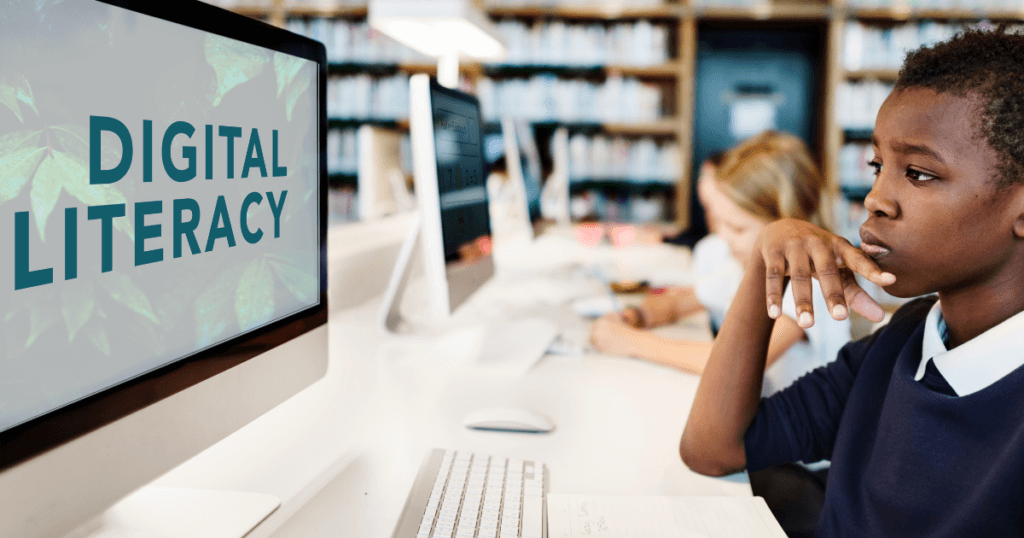In 2025, Digital Literacy is no longer optional: it is the bedrock of modern education and future success. Across the UK and beyond, educators, policymakers and industry leaders increasingly recognise that every student must master not only tools but critical understanding of the digital realm.
Table of Contents

The Rising Imperative for Digital Literacy
Historically introduced in the 1970s, digital literacy once referred simply to the ability to find and use information online. Today, it encompasses much more: discernment of credible sources, understanding of data privacy and AI ethics, cybersecurity awareness and creative capacity in digital content creation. In an era where AI tools are embedded in everyday learning—over 90 per cent of UK undergraduates now use generative AI for study support—students must be taught what these systems can really do and when they might mislead.
The World Economic Forum and OECD agree: digital skills and cognitive agility are high‑demand competencies that distinguish those who thrive from those left behind. With millions of adults still lacking basic digital capabilities—even in developed countries—the school years are pivotal for building a truly inclusive digital society.
What Every Student Must Know
1. Critical Information Evaluation
Students must learn how to evaluate credibility in a world awash with information. Understanding media bias, recognising misinformation, and verifying online content are essential strands of modern Digital Literacy.
2. Online Safety and Privacy
As education moves online, students need confidence in managing passwords, recognising phishing, and avoiding fraudulent scams—skills especially critical during adolescence. Educators are introducing “digital character” curriculum to address ethical use, privacy, and healthy online habits.
3. AI Literacy and Ethical Use of Tools
The newly introduced AI Literacy Framework by OECD and EU emphasises that knowing how to use AI is insufficient—students must also understand limitations, bias and responsible deployment, according to a report by weforum.org. Teaching AI literacy as part of Digital Literacy ensures students can harness these tools without misapplying them.
4. Computational Thinking and Problem Solving
Modern digital fluency means applying logic and computational approaches to solve real‑world problems. PISA 2025’s assessment tests self‑regulated learning and digital inquiry skills embedded in learning tasks, per oecd.org.
5. Content Creation & Communication
Beyond passive use, students must be able to create blogs, podcasts, videos and infographics, exercising Digital Literacy through purposeful expression and collaboration.
6. Accessibility and Inclusivity
Equitable access to devices and digital instruction remains uneven. Schools must ensure all learners, including those from underserved communities, benefit from Digital Literacy programmes.

Innovations Driving Digital Education in 2025
Personalised Learning Powered by AI
AI‑driven platforms tailor content, automate feedback and illuminate gaps in understanding, freeing educators to support students individually.
Immersive and Multimodal Experiences
Augmented reality, virtual learning scenarios, and hologram guest lecturers enrich engagement and strengthen interactive learning.
Gamification to Boost Engagement
Game‑based learning using points, badges, or leaderboards enhances motivation, smartly aligning with digital literacy goals rather than detracting from learning.
Collaborative Learning Online
Digital platforms support peer feedback, group projects and shared spaces that develop collective critical thinking and communication skills.
A UK Focus: Bridging the Gap
Despite broad access to technology, student confidence remains low: nearly 40 per cent of UK youths feel unsure about necessary digital skills, and over a third worry they don’t have them. Government and industry are stepping up:
- A £45 million UK initiative aims to upgrade school infrastructure and close the digital divide.
- Scotland’s Digital Literacy Week emphasises cybersecurity and AI ethics in school sessions.
- Regional programmes such as Greater Manchester’s combine Digital Literacy with soft‑skill training like empathy and time management.
Meanwhile, partnerships between non‑profits, tech companies and education foundations are delivering targeted training to underserved groups across the UK and globally
How Schools Can Deliver Digital Literacy in Practice
Integrate across the entire curriculum
Digital thinking should not be confined to IT lessons. Whether analysing media in English, presenting science digitally, or exploring bias in PSHE, Digital Literacy must be interwoven through every subject.
Invest in continuous teacher training
Many educators lack confidence in teaching AI, data handling or online wellness. Accessible, personalised CPD programmes help build real classroom confidence.
Establish clear policies
From AI use in assignments to device usage and privacy, school policies must be both enabling and ethically grounded. Students and educators benefit from explicit, shared guidelines .
Engage students as collaborators
Students often adopt new digital behaviours quickly. Involving them in co‑designing digital literacy lessons and policies yields better engagement and mutual understanding.
Prioritise inclusive design
Ensure all young learners, especially those from low‑income or rural communities, receive the same standards of digital instruction and access to tools.

Why It Matters — The Broader Impact
- Readiness for the future job market: Digital literacy is now a determinant between employability and obsolescence, given the automation of routine roles.
- Active citizenship: In digital-first systems—from voting to health services—understanding online navigation safeguards individual empowerment.
- Social and economic inclusion: Those who lack these foundational skills risk exclusion from work, education and civic life.
Conclusion
By 2025, Digital Literacy will have earned its status as a core life skill, on par with reading and numeracy. It equips students to navigate information, create responsibly, use advanced tools ethically and participate fully in society.
When embedded throughout schooling—not as an isolated topic but as a lens through which every subject is taught—Digital Literacy enriches learning, reduces the digital divide and positions youth for agency in an AI‑driven world. The call now is for educators, policymakers and communities to build the frameworks, training and infrastructure that make it happen.
Join Our Social Media Channels:
WhatsApp: NaijaEyes
Facebook: NaijaEyes
Twitter: NaijaEyes
Instagram: NaijaEyes
TikTok: NaijaEyes
READ THE LATEST EDUCATION NEWS





